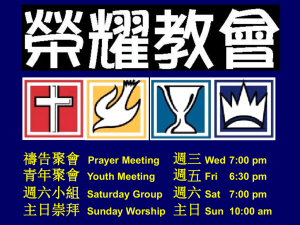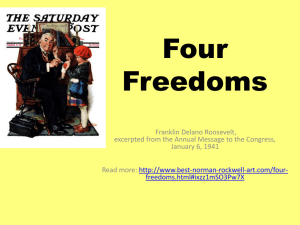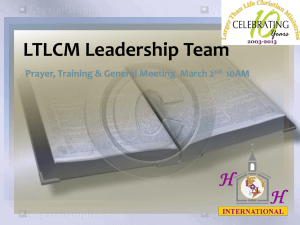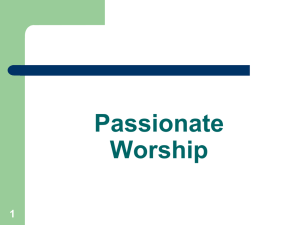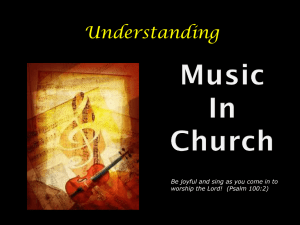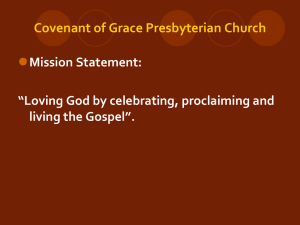Module 2: Worship - School of Congregational Development
advertisement
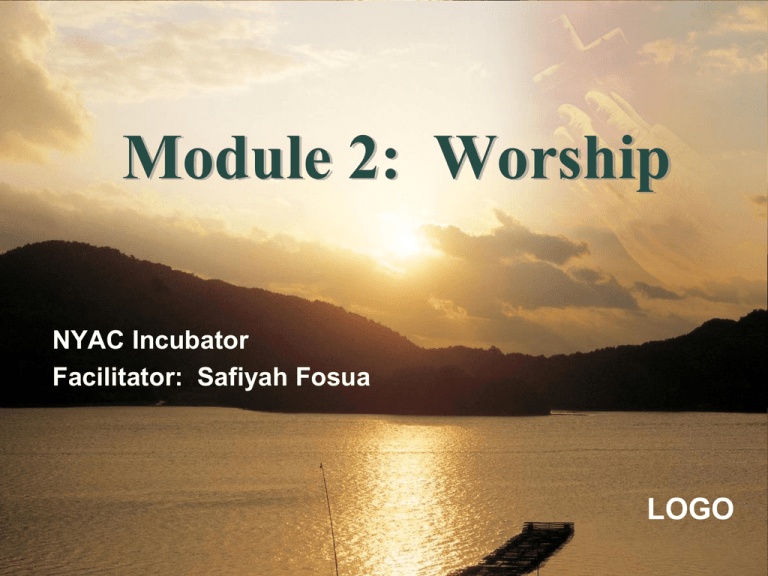
Module 2: Worship NYAC Incubator Facilitator: Safiyah Fosua LOGO Goals 1. Reflect on the purpose of worship in the life of congregations 2. Explore aspects of a basic theology of worship 3. Identify specific aspects of worship for further congregational development 4. Develop a strategy for enhancing the quality of worship in the local church setting Basic Format Loving Learning Leading Group covenant Module 2: Worship LOVING Biblical Reflection Read: (Luke 24:13-36) Question for silent reflection: “WHAT IS GOD SAYING TO ME THROUGH THIS PASSAGE?” Read Luke 24:13-36, again, from a different Bible translation Silent reflection and group discussion question: DESCRIBE A TIME WHEN YOU WERE SURPRISED TO DISCOVER THAT GOD HAD ALREADY BEEN PRESENT AND ACTIVE IN A PARTICULAR ASPECT OF YOUR LIFE How is it with your soul? Formation Questions? 1. Since we last met, how have you experienced the presence of God? 2. Who have you met with in your congregational setting to work on goals? 3. What are you learning about being a spiritual leader? “Touching Jesus” Read: Luke 24:36-48 (NRSV) Prayer Focus At your table groups, pray for the pastors and congregations that will be impacted by our work. Module 2: Worship LEARNING Why do you go to church? Why do you worship? Definition of Worship: (Cherry) “Christian worship is a God-instituted gift to the church for nurturing our relationship with God and others. Worship is above all to God, with God, and for God… (The Worship Architect, p. xii). Biblical Theology of Worship 1. Worship is grounded in God’s acts of salvation For the Jews the culminating event was the Passover For Christians the culminating event is the Cross 2. Worship is patterned in revelation and response Isaiah 6 Wise men or shepherds Simeon and Anna Palm Sunday Entry of Jesus into Jerusalem Reflection Question: How does worship create an environment where worshippers can truly encounter God and confront themselves? (Isaiah 6) 3. Worship is covenantal in nature (Exodus 6:7) I will take you as my people, and I will be your God. You shall know that I am the LORD your God, who has freed you from the burdens of the Egyptians. (NRSV) What does it mean to be God’s people? Worship is a Conversation! “First, is the worship relevant? I do not by relevant that the worship is personally satisfying to a particular set of worshippers, but rather that the worship meets the criterion of conversation between the culture and the Covenant (the biblical record, and that the volume is “up” on the biblical side of that equation… Dr. Valerie Bridgeman Davis, Introduction to the Africana Worship Book. 4. Worship is corporate It is not enough to worship alone. (Acts 2:42) They devoted themselves to the apostles' teaching and fellowship, to the breaking of bread and the prayers. (NRSV) (Hebrews 10:24-25) And let us consider how to provoke one another to love and good deeds, not neglecting to meet together, as is the habit of some, but encouraging one another, and all the more as you see the Day approaching. (NRSV) 5. There is a Trinitarian aspect to worship How is God addressed in worship? How do we conceptualize God? Are persons in the Trinity ignored or pushed aside? Worship is a journey of transformation 1. We journey together 2. We are all on different stages of that journey 3. Our shared goal is Christian Perfection Sermon as Meeting Place or Intersection Preacher People God Text The Preacher? Compassion Community Challenge Reasonability Commitment From Kennon Callahan, Preaching Grace (Preachers Only) How does your assumed identity affect your sermon? Pastor? Messenger? Evangelist? Storyteller? Witness? Counselor? (Preachers Only) How does your personal Image of God impact your worship and preaching? God of justice? God of mercy? God of love? God of vengeance? Indifferent God? Absent God? (Preachers Only) How do your beliefs about humanity impact your theology? Where does the history of humanity begin? In the Garden? At the Fall? For Reflection and Discussion Take a few minutes to identify your core beliefs about God. If you were asked to describe God to a stranger, list three adjectives that you would use. Write these down. Next, use only three adjectives to describe how you feel about the condition of humankind. Write these down Discuss the following with your table group: How did your last five sermons line up with your core beliefs about God and about humanity? Describe. The People: What do the people bring to this intersection ? (Copyright 2002 Larry Thomas and Christianity Today International. Used with permission.) Listening to Sermons: Back to Aristotle? Ethos – (Relationship) 40% of worshippers come for relationship Logos – (Content) 40% of worshippers come for content Pathos – (Feeling) 20% of worshippers are looking to be “moved” or “touched” Source: Ron Allen Hearing the Sermon: Relationship, Content, Feeling What about Worship Style Liturgical versus Evangelical Worship Contemporary and Emergent Liturgical Worship Camp Meeting Worship Exercise: Identify your Dominant Worship Style Exercise: using the chart on pages 240—241 place a check mark beside the descriptions that are most characteristic of your congregation’s preferred worship style. If you have multiple congregations, use a numbers or alphabets instead of a check mark as you keep in mind that a 3-point charge could have 3 or more different worship style preferences. How many in the room consider their worship: 1. 2. 3. 4. 5. Liturgical? Traditional? Contemporary? Blended? Emergent? a. In affinity groups, discuss the pros and cons of your preferred style of worship. b. Describe the gifts that each style of worship offers to the Body of Christ. Worship Style: Summary In any style of worship, People are looking for… (Thomas Long) Spirituality -- (Tom Long describes this as a yearning for mystery) Meaning -- is my life worth living? Community – are there good people out there who would be my friends? Guidance – can someone tell me what God wants me to do? (Beyond the Worship Wars) Module 2, Worship LEADING The Troublesome Context of Worship 59.59 Exercise: Identify your order of worship Using the masking tape and index cards show the progression of worship in your church on a Sunday morning. What happens first, what happens next? Etc. Tape the elements of your worship in vertical order and stand next to them as we discuss the order of worship from the newer UMC perspective. General Order of Worship Entrance and Gathering Scripture and Word Response to the Word Sending Forth Analyze your order of worship 1. In small groups, determine how closely your worship is aligned with the 4-fold order of worship described in the Book of Worship and the Worship Architect 2. Are there unnecessary elements present? 3. Are all four of the “basics” present? 4. Are there changes that you would like to suggest with your worship committee/staff? Worship Planning The Lectionary or Not? Lectionary Standardized Readings Ecumenical Variety of Themes Sometimes thought uninspiring or confining Series Freedom to choose and set parameters Sometimes the preacher is burnt-out or uninspired and recycles old ideas (again and again) Selecting a Text Finding a topic or theme for Sunday Selecting a Text Read and select text Determine the theme that best fits the needs of your congregation Sample Quarterly Planning Grid Date Text Theme Music Visual Environment Worship leaders Special notes/ details Exercise: Discuss handout: “Twenty-One Questions” Which of these do you feel that your congregation already does well? Which of these would be a disruptive challenge for your congregation? Homework: Discuss 21 Questions with members of your worship committee/staff. Target 1-3 areas for work and write down concrete plans for enhancing worship that will take effect before the next time that we meet. Discuss the Order of Worship with worship planners within your congregation. How well does your order align with the suggested four-fold pattern of worship? Closing Worship LOGO Litany Leader: Gracious God, our Savior, we have gathered People: To worship you. Leader: Gathered, People: To renew our faith. Leader: Gathered, People: To remember your wonder-filled works. Litany Leader: Gracious God, our Savior, we have gathered People: To worship you. Leader: Gathered, People: To renew our faith. Leader: Gathered, People: To remember your wonder-filled works. Leader: By your Spirit People: You taught us, Leader: Inspired us, People: And reminded us, Leader: That we are the people of God People: Who worship a Living God Leader: And practice a living faith. All: Until you return, may we be one in faithful ministry through our prayers, presence, gifts, service, and witness. Closing Hymn “Make Us One” #2224 The Faith We Sing Sending into Service We have drunk from the well that never runs dry. Our thirst quenched, our souls bathed, may we extend worship into the world that awaits. Loving God. Loving neighbor. Amen. (Closing worship for Module 2 by Kwasi Kena. Permission granted to reproduce for use in the local church.) Closing Prayer
